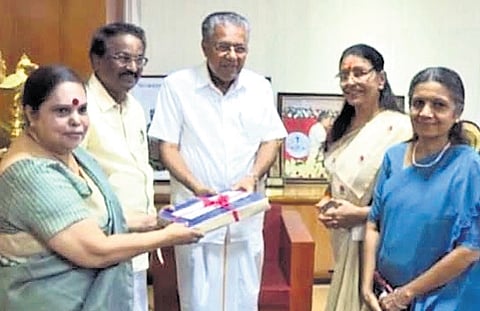

THIRUVANANTHAPURAM: Sexual harassment, blackmailing, unofficial ban, mafia-like industry, casting couch, gender discrimination, lack of basic facilities including toilets and changing rooms, alcohol and drug abuse, denial of roles and remuneration, forcing artists to compromise, in addition to lack of proper legal system to address the problems have been identified as the key issues faced by women working in the Malayalam film industry.
The Justice Hema Committee constituted to look into harassment faced by women in the field, observed that the industry is in the clutches of an all-male power group comprising 10 to 15 people. The group controls everything and can impose unofficial bans on anyone. The report also mentioned about a powerful lobby in the industry, which it termed as “mafia”. The committee observed that casting couch is a reality in Malayalam cinema.
The report narrated plenty of instances including blackmailing and sexual harassment attempts. In one such instance, the actor was told about the extent of nudity that will be exposed, before the shooting started. She was told that only a portion of her backside will be exposed. But during shooting she was asked to do a lip lock scene.
Similarly an actor, who was donning the title character, was informed that there will be an intimate scene. One day the director told her that there will be nudity and lip lock scenes. She was forced to do a kissing scene and expose her body. Later, she was told that there will be nudity and a bath tub scene. She refused to continue and left without taking remuneration. Even after she demanded the director refused to delete the intimate scenes, said the report.
Almost five years after the committee submitted it, the state government released the report on Monday under the RTI Act, after a slew of legal battles before the State Information Commission and the Kerala High Court.
The three-member panel, headed by Justice K Hema, had former IAS officer K B Valsalakumari and veteran actor Sarada as its members. The government released a 233-page report after removing close to 65 pages from the original document, which is based on testimonies of more than 50 professionals, including actors and technicians.
The most important finding of the panel is about a male power group. About 10 to 15 individuals who stand in the forefront of the Malayalam film industry constitute the core power group, it observed.
“Certain actors in cinema (some of them are also producers, distributors, exhibitors or directors) — all male — gained enormous fame and wealth and they are in full control of the whole industry now,” reads the report.
Many individuals, including famous actors, were banned from cinema. Offending any member of the power group, knowingly or unknowingly, even over a silly reason, could invite a ban. “If a member from the power group is not pleased with someone in cinema (be he/she an actor, producer, director or anyone in cinema, however efficient), because of even personal prejudice, all the members of power group join hands, and such a person is prevented from working in cinema,” said the report.
‘Knocks on the door’ at untimely hours
The report also mentioned about how members of the Women in Cinema Collective (WCC) are being targeted for the only reason that they protested against atrocities in cinema. The panel said there should be a forum to address the issues. The report highlighted lack of privacy and inadequate facilities for women artists, in addition to the inhuman treatment being meted out to junior artists. Those who testified before the panel also pointed at reluctance of women to approach the police. Actresses being public figures are at a higher risk of consequences like cyber attacks.
The committee also detailed lack of basic facilities, including toilets, safe changing rooms and accommodation. Sexual harassment included the casting couch syndrome and ‘knocks on the door’ at untimely hours, on the presumption that all women who wanted to be part of the field would be willing to compromise to any extent. A lack of written contract was used to delaying or even denying payments, citing superfluous reasons, the report observed.
There are mentions about widespread alcohol and drug abuse, cyber attacks by ‘fan clubs’ on those who draw the ire of the power centre. Equal remuneration remains a distant dream. It further observed that Internal Complaints Committee (ICC) often fails to address the issues. The panel recommended to the government to bring in a legislation to address issues faced by women in Malayalam film industry.